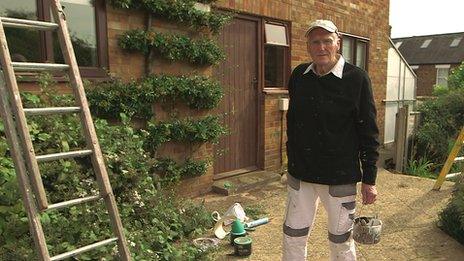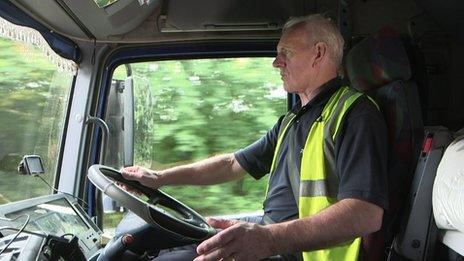The older workers who keep going
- Published

Bob Hooker has no intention of retiring any time soon
As his 80th birthday approached, Bob Hooker decided to slow down a little.
Instead of eight hours a day of painting and decorating, he asked his son and business partner if he could cut down a little - to just seven hours a day.
But when big jobs needed to be finished, he still finds himself putting in extra hours up his ladder to get it done.
"I think I'd stagnate if I had to stay at home," he says. "I feel sorry for people that have to retire."
And a growing number feel the same way.
According to official figures, there are 32,000 people in the UK who are in their 80s and still hard at work, a figure that has increased by more than half in the past 10 years.
And as the post-war baby boom generation reach their mid-60s, it's becoming increasingly common to work past what used to be the official retirement age.
Just over one million people are still working past the age of 65, and 324,000 of those are 70 and over.
Many more years
There are still some jobs you can't do. For example, the danger of sudden medical problems means that airline pilots cannot fly internationally past the age of 65, and if they are over 60, they must have a co-pilot who is under 60.
But better lifestyles, better diets and better medicines mean that many people now reach their pension age in good health, with every chance of more healthy years ahead.
Not everyone wants to fill those years with Bingo and bowls, though.
For Bob, staying in work is not a problem, as he's his own boss. But for big employers, it's not so simple.
The NHS is Europe's biggest employer, and it makes extensive use of older workers.
In England there are 1,453 GPs, 1,207 hospital doctors and 14,816 nurses and support staff still practising past their 65th birthday.
It's conducting an extensive review of the issues raised by working longer. Its research so far suggests that over-65s in good health are just as capable as their younger counterparts. Extending the working life of staff helps to fill skill shortages.
Needing the money
But would older workers require easier shift patterns? Is that fair to their younger colleagues? And how do you evaluate if someone is no longer up to the job? These are all unanswered questions.
The government is certainly keen to see more older workers. Compulsory retirement in the UK was abolished in 2011, and the state pension age is due to increase to 68 by 2048.
As a nation, extending working lives is seen as a vital to keeping the country's pension system in balance - and if everyone worked for an extra year, it would add 1% to national income, according to government estimates.

Eddie Friel loves his job but admits he cannot afford to stop working
But many work longer because they need the extra money. Eddie Friel is a removal man from Glasgow. At the age of 68, he drives the length and breadth of Scotland, sometimes further afield, often sleeping in his van, and helping his colleagues load and unload.
He loves his job, but he couldn't afford to retire.
"I do need the money," he says. "If I'm left with my government pension and my company pension I have not got enough."
The self-employed are particularly likely to be in this position. Some 47% of employees aged 60 to 64 are saving for a pension, but only 20% of the self-employed do.
Many of those will reach 65 without enough money to fund the lifestyle they want.
Hurting younger workers?
But if all these people are retiring later, are they taking jobs from the young? Eddie says he doesn't see a lot of young people wanting to do his physically demanding job. If he did, he'd be happy to go part-time to make way for them.
There are obviously examples where an older worker occupies an individual position which another younger worker might want.
And in 2011, a survey by the law firm Norton Rose found that more than a fifth of companies would find it harder to hire younger workers after the state retirement age was abolished.
But older people in work will earn more, and spend more, creating extra economic activity. That should create employment opportunities for other workers, young and old.
And many professions complain of a shortage of qualified staff. The Chartered Institute for Personnel and Development estimates that there will be nearly two vacancies created for each school or college leaver over the next 10 years.
It's yet another reason why the number of people working past 65 has nearly doubled in the past 10 years. Government policy, demographics and business needs all seem likely to push that number even higher.
And if current trends continue, there will soon be a lot more 80-year-olds up ladders like Bob Hooker.
For many, the traditional idea of retirement is looking just a little old-fashioned.
- Published10 October 2013
- Published2 May 2013
- Published8 March 2013